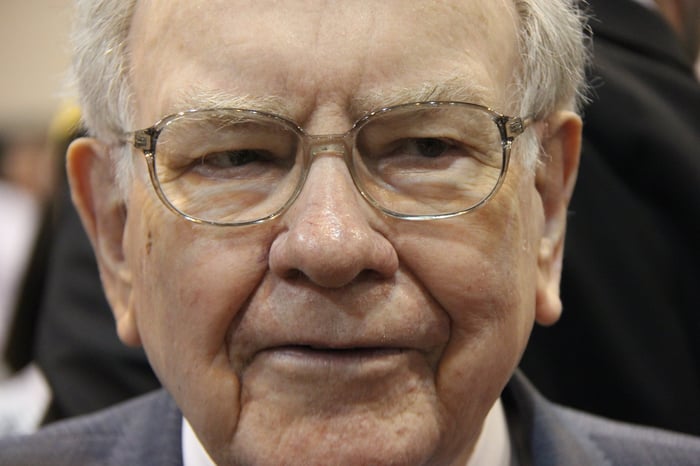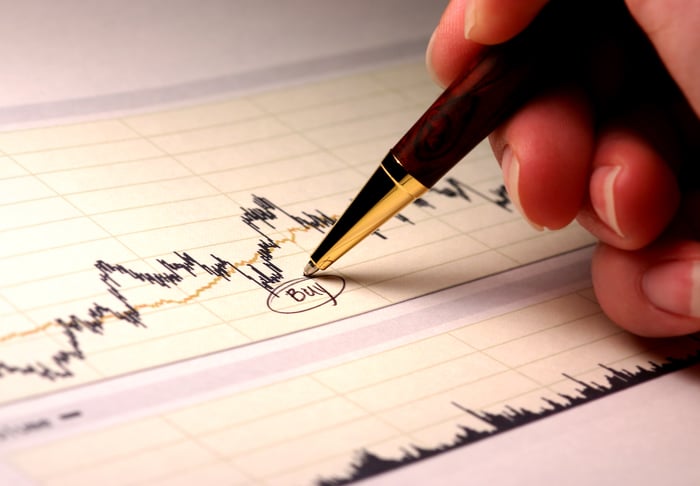|
|
|

|
|||||

|
|
Warren Buffett is lauded by investors for his outsize investment returns, as well as his willingness to share the traits he looks for in businesses when putting Berkshire's capital to work.
Buffett's value-focused investment approach amid a historically expensive stock market has sent his company's cash pile soaring.
However, the Oracle of Omaha's patience and optimism are precisely what have made Berkshire such a great investment.
It's the end of an era on Wall Street. In less than four months, Berkshire Hathaway's (NYSE: BRK.A)(NYSE: BRK.B) Warren Buffett will retire from the CEO role he's held for six decades. During his 60 years at the helm, he's overseen a roughly 6,140,000% cumulative gain in his company's Class A shares (BRK.A), which compares quite favorably to the roughly 43,300% total return, including dividends, delivered by the benchmark S&P 500 (SNPINDEX: ^GSPC) over the same timeline.
The Oracle of Omaha's outperformance has made him the most-followed money manager on Wall Street, with some investors riding his coattails to substantial long-term gains.
Where to invest $1,000 right now? Our analyst team just revealed what they believe are the 10 best stocks to buy right now. Continue »

Berkshire Hathaway CEO Warren Buffett. Image source: The Motley Fool.
But the other factor -- aside from market-crushing returns -- investors have come to appreciate about Buffett is his willingness to share his thoughts and the company traits he looks for when taking stakes in wonderful businesses. Whether it's Berkshire's annual shareholder letter or the company's yearly meeting, Buffett is no stranger to offering up nuggets of wisdom.
While books have been written about Warren Buffett's investment ideals, four ominous words from Berkshire's latest shareholder letter perfectly encapsulate why he's such a phenomenal investor, and explain why his recent investment activity sends a clear warning to Wall Street.
Investors are likely aware of some of the Oracle of Omaha's core principles. For example, Buffett prefers to buy stakes in companies with sustainable competitive advantages, strong management teams, and hearty capital return programs. He also looks at investments as multiyear or multidecade commitments, with eight stocks in Berkshire's portfolio currently considered "indefinite" holdings.
But possibly the best investment advice Buffett has ever offered, which perfectly encapsulates the promise and peril of the stock market, was penned in Berkshire Hathaway's latest annual shareholder letter. While discussing where his company has money allocated, Buffett proclaimed, "Often, nothing looks compelling."
At his core, Berkshire's billionaire boss is an unwavering value investor. Though there are some unwritten "Buffett rules" that sometimes get broken, such as investing for the short-term via an arbitrage opportunity, Berkshire's head honcho isn't willing to buy a stock if its valuation doesn't make sense.
Warren Buffett Indicator hits 215%, the most expensive stock market valuation in history 👀 pic.twitter.com/kjnbGN67be
-- Barchart (@Barchart) August 29, 2025
At the moment, stock valuations are historically expensive. Keeping in mind that valuation is subjective, the affably dubbed "Buffett Indicator" recently hit an all-time high. This valuation measure adds up the cumulative market cap of all public companies in the U.S. and divides this figure by U.S. gross domestic product (GDP).
The market cap-to-GDP ratio, which has averaged closer to 85% of U.S. GDP when back-tested to 1970, surpassed 214% in late August. In other words, finding value has been exceedingly difficult for Buffett and his team.
Beginning in October 2022, the Oracle of Omaha began selling more stock than he was purchasing. This net-selling activity has been ongoing for 11 consecutive quarters (Oct. 1, 2022 – June 30, 2025), totaling $177.4 billion in net stock sales. All the while, Berkshire Hathaway's cash pile, which includes cash, cash equivalents, and U.S. Treasuries, has ballooned to a near-record $344.1 billion.
Despite sitting on $344 billion in capital, Buffett prefers to be a net-seller of stocks, and isn't even buying shares of his own company any longer. It's as direct a warning as Wall Street will get from Berkshire's billionaire chief.

Image source: Getty Images.
Though Buffett's ominous advice – "often, nothing looks compelling" -- perfectly explains why he's been more of a seller than a buyer amid a historically pricey stock market, it also provides a backdrop of how Berkshire's boss has been able to deliver outsized returns spanning six decades.
Fundamentally, Warren Buffett is well aware that the U.S. economy and stock market have both expanded over the long run. Even though recessions and stock market corrections are normal and inevitable aspects of respective economic and stock market cycles, optimism prevails over long periods. This means being patient and waiting for price dislocations to become apparent is a winning and time-tested strategy -- in case the nearly 6,140,000% aggregate return for Berkshire's Class A shares didn't give it away.
In August 2011, shortly after the worst of the financial crisis, the Oracle of Omaha engineered a $5 billion stake in Bank of America (NYSE: BAC) preferred stock. While Bank of America wasn't desperate for cash, it wasn't going to turn down the opportunity to shore up its balance sheet amid ongoing litigation and a still-uncertain loan portfolio.
When Buffett initially made this investment, Bank of America's common stock was trading at a 62% discount to its book value. But in the summer of 2017, Berkshire exercised its warrants to purchase 700 million shares of BofA stock at $7.14 per share. This August 2011 price dislocation instantly netted Berkshire a $12 billion (unrealized) profit, which has since grown even larger.
Berkshire's billionaire CEO recognized a price dislocation with Apple (NASDAQ: AAPL), as well, in early 2016. The maker of the beloved iPhone was trading at just 10 to 15 times forward-year earnings nine years ago, which is an inexpensive valuation for a company that had been consistently growing by high single digits to low double digits annually. Apple stock has jumped approximately tenfold since Buffett first entered the position, with artificial intelligence euphoria and the company's rapidly growing services segment doing a lot of the heavy lifting.
Although it can be frustrating waiting for Warren Buffett and his top advisors to deploy Berkshire Hathaway's treasure chest, being patient has paid off handsomely for decades. When price dislocations do become apparent in the future, Buffett or his successor Greg Abel will be ready to pounce.
Before you buy stock in Berkshire Hathaway, consider this:
The Motley Fool Stock Advisor analyst team just identified what they believe are the 10 best stocks for investors to buy now… and Berkshire Hathaway wasn’t one of them. The 10 stocks that made the cut could produce monster returns in the coming years.
Consider when Netflix made this list on December 17, 2004... if you invested $1,000 at the time of our recommendation, you’d have $670,781!* Or when Nvidia made this list on April 15, 2005... if you invested $1,000 at the time of our recommendation, you’d have $1,023,752!*
Now, it’s worth noting Stock Advisor’s total average return is 1,052% — a market-crushing outperformance compared to 185% for the S&P 500. Don’t miss out on the latest top 10 list, available when you join Stock Advisor.
*Stock Advisor returns as of August 25, 2025
Bank of America is an advertising partner of Motley Fool Money. Sean Williams has positions in Bank of America. The Motley Fool has positions in and recommends Apple and Berkshire Hathaway. The Motley Fool has a disclosure policy.
| 52 min | |
| 1 hour |
Iran Says Khamenei Killed As U.S.-Israeli Attacks Continue; Dow Jones Futures Loom
AAPL
Investor's Business Daily
|
| 3 hours | |
| 3 hours |
Trump Says Khamenei Killed In U.S.-Israeli Attacks. How Will Dow Jones Futures React?
AAPL
Investor's Business Daily
|
| 4 hours | |
| 6 hours | |
| 7 hours |
Trump Says Khamenei Likely Killed In U.S.-Israeli Attacks On Iran. How Will Dow Jones Futures React?
AAPL
Investor's Business Daily
|
| 7 hours | |
| 9 hours | |
| 10 hours |
Stock Market Week: Reaction To Iran, Berkshire Earnings, Apple Event
BRK-B
Investor's Business Daily
|
| 10 hours |
Stock Market Week: Reaction To Iran, Berkshire Earnings, Apple Event
AAPL BRK-A
Investor's Business Daily
|
| 11 hours | |
| 12 hours | |
| 12 hours | |
| 13 hours |
Join thousands of traders who make more informed decisions with our premium features. Real-time quotes, advanced visualizations, backtesting, and much more.
Learn more about FINVIZ*Elite